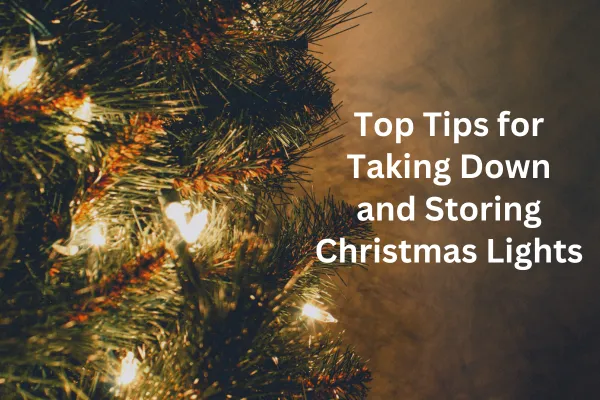Podcast

Top Tip for Taking Down and Storing Christmas Lights
As the holiday season's magic dims, you're faced with the daunting task of untangling and storing away your Christmas lights. It's a chore that many dread, but with a few expert tricks up your sleeve, you'll find it's not as complicated as it seems. You've likely spent hours perfecting your home's festive glow, so it's crucial not to let haste or frustration lead to tangled wires and broken bulbs. In the following guide, we'll unveil some professional strategies for efficiently taking down and storing your lights, ensuring they remain in top condition for years to come. Curious? Let's commence on this enlightening journey together, where simplicity and care pave the way to a hassle-free holiday cleanup.

Storage Solutions and Precautions
Choosing the right storage solutions and taking necessary precautions can significantly extend the lifespan of your Christmas lights. When it comes to container options, you've got a few choices. You might lean towards using plastic bins or cardboard boxes. These are not only cost-effective but also readily available. However, it's crucial you ensure your lights are completely dry before tucking them away. Moisture prevention is key to avoiding any electrical mishaps or corrosion of the wires.
Now, you might think the attic is a great out-of-the-way spot to store your holiday gear, but beware of attic hazards. The temperature impact from the sweltering heat in summer or the biting cold in winter can be detrimental to your lights. High temperatures, especially, can lead to insulation damage or even melt the plastic components of your lights.
Instead, consider garage storage. Storing your lights in the garage can shield them from extreme temperature changes. Remember, though, to keep them in a dry area within your garage to fend off moisture. If your garage tends to get damp, throw in some silica gel packets into your storage containers for extra protection against moisture.
In essence, making the right choices in storage can save you from the heartache of untangling damaged or non-functional lights next season. Stick with simple storage solutions, keep moisture and temperature in check, and you'll find that keeping your Christmas lights in perfect working order year after year is easier than you think.

Wrapping Techniques Simplified
Wrapping your Christmas lights doesn't have to be a tangled mess; here's a straightforward method to keep them organized and ready for next season. First, let's tackle the debate of knotting vs. balling. Knotting can lead to a frustrating detangling session next year, so you're better off with a tangle-free winding approach. Start by gently folding your lights in a neat zig-zag pattern or wrap them around your hand and elbow to create a loop. This method ensures they unravel easily when you're ready to decorate again.
Now, onto zip tie tricks. Zip ties are your best friend for keeping your lights bundled without damaging them. Secure a zip tie around the looped or zig-zagged lights, but ensure it's not too tight to avoid damaging the wires. The beauty of zip ties? They're cheap and can be easily cut off when you're ready to use the lights again.
Proper plug positioning is crucial. Always start wrapping from the female end, leaving the male plug accessible. This way, you can easily test your lights before next season's installation without unwinding the entire bundle.
Lastly, don't underestimate the importance of choosing the right storage containers. Plastic bins or cardboard boxes work well, but ensure they're dry and stored in a temperature-controlled environment like your house or garage. This keeps your lights safe from moisture and extreme temperatures, ensuring they light up beautifully year after year.

Organizing Perimeter Lights
When organizing perimeter lights, it's crucial to label each section, ensuring a hassle-free reinstallation next holiday season. As you take down your lights, start by carefully removing them from the roofline and ground areas. For roofline installation, you'll want to pay special attention to how each section is connected. Labeling sections as you go simplifies the process, making it clear where each part belongs when you're setting up again.
For ground lighting, it's often best to leave the stakes attached, if possible. This approach saves time next year, as you won't have to figure out which stake goes where. However, if you decide to remove the stakes, remember to label them alongside their corresponding lights.
Clip removal is another step that requires a gentle touch. If your clips are reusable and still in good shape, carefully detach them from your lights and house. Then, store them in a clearly labeled bag or container. This makes it easier to find and reuse them next season.
Plug positioning is the final, but an equally important step in organizing your perimeter lights. Ensure the male plug is correctly positioned and accessible for each section. This not only aids in testing the lights before next season's installation but also prevents potential damage to the plugs themselves.

Year-Round Storage Insights
Opting for a practical storage solution ensures your Christmas lights remain in top condition and ready for use, whether for seasonal decoration or year-round ambiance. Space-saving options are crucial, especially if you're tight on storage. Consider using vacuum-sealed bags for smaller strands or repurposing household items, like wrapping paper tubes, to keep lights organized and compact. This not only saves space but also prevents tangling, making your life easier come next holiday season or whenever you decide to use them again.
When it comes to weather-resistant options, if you're planning on using your lights outdoors throughout the year, investing in durable, waterproof storage containers is key. These will protect your lights from moisture and other elements when not in use. Plus, they can be easily stacked in your garage or shed, keeping your lights safe and out of the way.
For those who love creative display ideas, think about ways to incorporate Christmas lights into your home or garden decor year-round. Fairy lights can add a cozy ambiance to a bedroom or patio, while larger bulbs can brighten up garden paths or outdoor seating areas. Just make sure you're storing them in a way that's accessible and makes sense for their next use.
Storage location ideas include under-bed storage containers for easy access or high shelves in closets. Just remember to label everything clearly to avoid confusion later on. And don't forget about maintenance tips: inspect your lights for any damage before storing and gently coil them to prevent wear and tear. This ensures they'll be in perfect working order for their next outing, whether that's for Christmas or a summer barbecue.

Handling and Securing Lights
Carefully handling and securing your Christmas lights ensures they're ready for use next season without any hitches. Proper organization is key to ensuring that you're not greeted by a tangled mess when the festive season rolls around again. Before you start, take handling precautions to avoid damaging the bulbs and cords. Wear gloves to protect your hands and carefully remove each light strand from its display.
Once you've got all your lights down, it's time for some light maintenance. Check each strand for broken or burnt-out bulbs and replace them before storage. This simple step can save you a lot of headaches later on. Cord management is crucial during this process. Instead of just balling them up, try winding each strand neatly around a piece of cardboard or a specially made reel. This not only prevents tangling but also makes it easier to unwind them next year.
When it comes to secure storage, don't skimp. Use sturdy plastic bins or cardboard boxes to store your lights. These containers protect your lights from moisture, which can cause power interruptions, and other environmental factors that could damage them while in storage. Make sure each strand is dry before packing it away to prevent corrosion or mold growth.

How Can I Prevent My Christmas Lights From Tangling When I Take Them Down, if I Don't Have Time to Properly Wrap Each Strand?
If you're short on time, try quick coiling your Christmas lights loosely to avoid tangles. You can also wrap them around a piece of cardboard or an old hanger for easy unraveling next year. Use twist ties or rubber bands to secure the ends and keep everything neat. This method's fast and prevents the dreaded light knot mess, ensuring you're not spending hours untangling next holiday season.
Are There Any Environmentally Friendly Alternatives to Plastic Bins for Storing Christmas Lights?
Absolutely, you've got greener options to stash away those twinkly lights. Consider using old newspapers or egg cartons for cushioning. Cardboard dividers can keep things tidy inside reusable bags or fabric wraps, ensuring everything stays untangled and ready for next year. Not only does this approach save you from buying new plastic bins, but it also repurposes items you've likely got lying around the house. It's a win-win for you and the planet!
Can Certain Types of Christmas Lights Degrade or Lose Their Color Over Time in Storage, and How Can This Be Prevented?
Yes, your Christmas lights can degrade and lose their color over time in storage, mainly due to light degradation, UV damage, and humidity effects. To prevent this, choose the right storage materials. Avoid areas with high humidity and direct sunlight exposure. Wrap your lights carefully, ensuring they're dry and stored in a cool, dark place. This helps maintain color retention and keeps your lights shining bright for years to come.
What Are the Best Practices for Storing Battery-Operated Christmas Lights to Ensure the Batteries Don't Corrode and Damage the Lights?
For your battery-operated Christmas lights, first off, remove the batteries to avoid corrosion that can wreck your lights. Store them in a dry place, using storage containers that fend off moisture, safeguarding battery longevity. Make a habit of inspecting them annually before storage to catch any issues early. This removal timing and inspection routine ensures your lights are in top shape, year after year. Moisture prevention is key, so keep them in a cool, dry spot.
How Do I Safely Dispose of or Recycle Old, Non-Working Christmas Lights That Can't Be Stored for Future Use?
If you've got old, non-working Christmas lights, don't just toss them in the trash. Look for local recycling centers that accept electronic waste. Some places even offer donation options for lights that can be repaired. Check out electronics repair services or local programs aimed at recycling holiday decorations. By choosing to recycle or donate, you're helping reduce waste and giving your lights a shot at a second life.
With these tips, you've got everything you need to take down and store your Christmas lights like a pro. By choosing the right storage solutions, mastering easy wrapping techniques, and organizing your lights efficiently, you'll safeguard them from damage and tangling. Remember, it's all about keeping things tidy and accessible for next year. So, don't let the post-holiday cleanup get you down; instead, look forward to effortlessly decking the halls when the festive season rolls around again. Happy storing!


Copyright ©2026 All Right Reserved website designed by christmaslights.io
Terms of Service / Privacy Policy
Have questions or need assistance?
Contact us at (855)619-LITE


